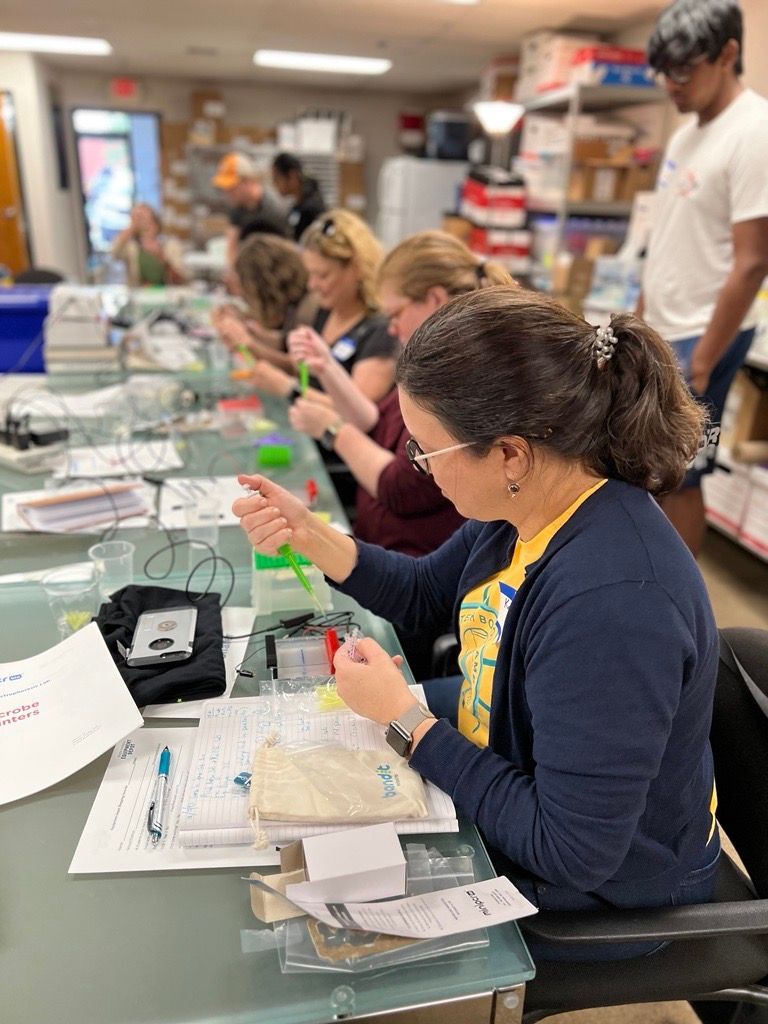
The life science industry and its innovations are always advancing, always evolving in a never ending quest to address unmet patient and clinical needs. Industry organizations like Georgia Bio may not experience the frequency of flux – driven in large part by new technologies – as the members and partner entities we serve, but when significant change is needed, we are committed to swift action.
Such was the case earlier this year when Georgia Bio returned to our core mission and re-established our independence as a 501(c)6 advocacy organization from the Center for Global Health Innovation. From our November 1st announcement , “The ‘re-emergence’ of Georgia Bio is an industry demand-driven development. Academic and industry life science leaders have told us directly that they need a strong advocacy organization around which to engage with each other and advance their priorities. Those industry leaders are also prepared to provide the financial support required for Georgia Bio to be the entity that provides those services.”
What other accomplishments can we as an organization and industry celebrate from 2023 and what do we look forward to in 2024?
The Rural Teacher Training Initiative, a program administered by our BioEd Institute, launched its fifth year in September. RTTI provides hands-on, immersive science teacher professional development for rural Georgia teachers. Curriculum is built to highlight and leverage the biotechnology that exists within traditional science courses, including biology and AP biology, chemistry and AP chemistry, physics, environmental biology, agriculture and horticulture, physical science, and life science.

Funded by the State of Georgia, we have reached more than 52,000 students in 87 counties across the state through 370 educators who have participated in the program since its inaugural year, 2019. 70% of these educators and students teach and learn in Title I schools.
RTTI 5.0 will have a Fall Training series followed by Spring Training Series. The Fall Series is virtual, live, hands-on, and will take place over four, two-hour sessions. Participants will be sent supplies to engage and practice during each session.
Back to the Summit!
Our Innovation Summit returned, this time hosted by our friends in Sandy Springs, bringing together more than 300 of our industry, advocacy and higher ed colleagues. Check out the highlights in our recap posts including BIO Board Chair Ted Love’s keynote
, venture funding
and AI & medtech
sessions.

As part of the program, we celebrated Johns Creek and its certification as a BioReady Community, the first municipality in Georgia so designated. As just the second state in the country to formally adopt such a program, the BioReady Communities program will allow Georgia’s municipalities to showcase biotech-zoned science parks, streamline permitting, build a robust infrastructure, and identify biotech-friendly sites more effectively in the interest of attracting companies interested in relocating. Read more.
How about “Southeast Venture Investment”
In the interest of serving the life science ecosystem beyond our historic focus on pharma, ag tech, legislative affairs, education and workforce development, we worked closely with Life Science Nation to create and confirm RESI South. (In a peek behind the curtain, bringing these opportunities to the ecosystem don’t happen in a vacuum. It took the collective team six months to make the upcoming event opportunity real.)

“Dennis Ford, CEO of Life Science Nation [stated], ‘I have seen firsthand the incredible opportunities abounding in the Southeast U.S. with a plethora of colleges, universities, and hospitals, fostering life science research and development. This is combined with an amazing array of incubators, accelerators, regional and governmental entrepreneurial programs, and world-class Bio Clusters supporting startups across all phases of development. LSN’s global partnering network wants to tap into these seven states’ technological and innovative firepower.’” The in-person piece of RESI South is March 24 at the Whitley Hotel in Atlanta. Follow Life Science Nation (and this space) for additional details.
Speaking of next year…
One of our top priorities for 2024 will be supporting our industry colleagues and patient advocacy groups. As we wrote recently, “Americans want policymakers to see lowering out-of-pocket costs for health care as a top priority. Putting pharma and its innovators who invest billions of dollars in R&D for therapies that improve outcomes and save lives in villainous crosshairs is easy to understand and politically expedient, but misguided.
“In 2021, West Virginia became the first state in the nation to adopt ground-breaking legislation related to drug pricing and PBM transparency. The State of Georgia is considering HB343 in its upcoming legislative session, requiring insurers and their PBMs to share the savings they negotiate on medicines directly with patients.”
It is likely more states will consider similar legislation. In this “environment,” it has never been more important for pharma to clearly communicate the value of its therapies or to deliver those therapies with great efficiency.
You can learn more about how we support the industry through legislative affairs by reading out Legislative Watch publication that we issue during GA Session. Take a look at our policy priorities, including support for academic research institutions within the University System of Georgia that feed industry innovation here.
New Digs!
A big thank you to Eversheds Sutherland and Bill Warren for “hosting” our offices for the past seven years, Georgia Bio is now seeking a new home for 2024. Have space? Interesting in sharing? Contact Maria!
Telling our story

During his Summit keynote, Dr. Ted Love emphasized the importance of ‘taking back our narrative’ as it relates to the beating pharma cos have taken in the drug price debate. Georgia Bio will endeavor to follow that lead by developing and sharing more content featuring our members, our partners, industry, advocate, legislative and education in the coming year. Our collective work matters to patients, to business, to our state and local economic growth and we intend to make sure the importance of that work, and its outcomes, is well known.
If you have a story you’d like to share or help tell, we welcome your ideas. Email admin@gabio.org.
Organizationally, we are adding three new committees to our roster: business strategy, medtech (as mentioned in our November 1 missive), and innovation and entrepreneurship. One of the innovation and entrepreneurship committee’s charges will be to support venture events and young company pitch events throughout the state. We are also preparing to launch a new “Fellows Program” which offers companies the opportunity to access Georgia Bio’s extensive services, benefits, and network to help them grow. The program offers a three-year membership providing early-stage life science, biotech, and medtech companies full access to the complete Georgia Bio portfolio of benefits, including the Georgia Bio purchasing consortium and discounted access to seminars, conferences, and networking events.
Again, we encourage you to get in touch with insights on events, organizations, young companies or investors with whom we should be in touch or aware.
In closing: a few asks
We are a member-driven and funded organization. As such, we need your help to not only ensure you and your organization’s membership is accounted for in forward-facing budgets, but also to communicate our value and share our stories encouraging others to become members.
We commit to listening closely to our members and partners to best understand how we can deliver value for your membership and/or sponsorships in events like the Summit.
A few recommendations:
- To our large institutions and enterprises: engage locally, keep a close eye on the Georgia legislative session and stay in touch. We are working to advance your mission in innovation and health.
- Smaller companies including life science startups of all disciplines: get engaged with our new committees, participate in the Business Solutions program to save money on everything from lab supplies to shipping, watch for RESI South registration details and jump in!
- To all, ask about our new sponsor packages.
- Patient advocates: help us help you tell your (our) story. Get in touch and we can add your story to our patient blog.
- Higher ed colleagues: Assign faculty to directly engage with us regularly, especially for innovation inclined faculty. Because a huge portion of successful life science innovation that becomes commercially available is born in academic settings, our relationship with and advocacy for industry is more closely tied to your mission and success that you might think.
- For all, engage with us on social media!
If you’ve made it this far, thank you for reading! Look out for an announcement of our 2024 Board of Directors in the new year.
The Georgia Bio team wishes you joyful, safe and restful holidays, and a healthy, prosperous new year.
If you’re not already doing so, we encourage you to register for our weekly newsletter and follow us on LinkedIn.


P: 404.221.0617
Fax: 404.448.3982
Email: admin@galifesciences.org
Address: 8607 Roberts Drive, Suite 250, Atlanta, GA 30350


